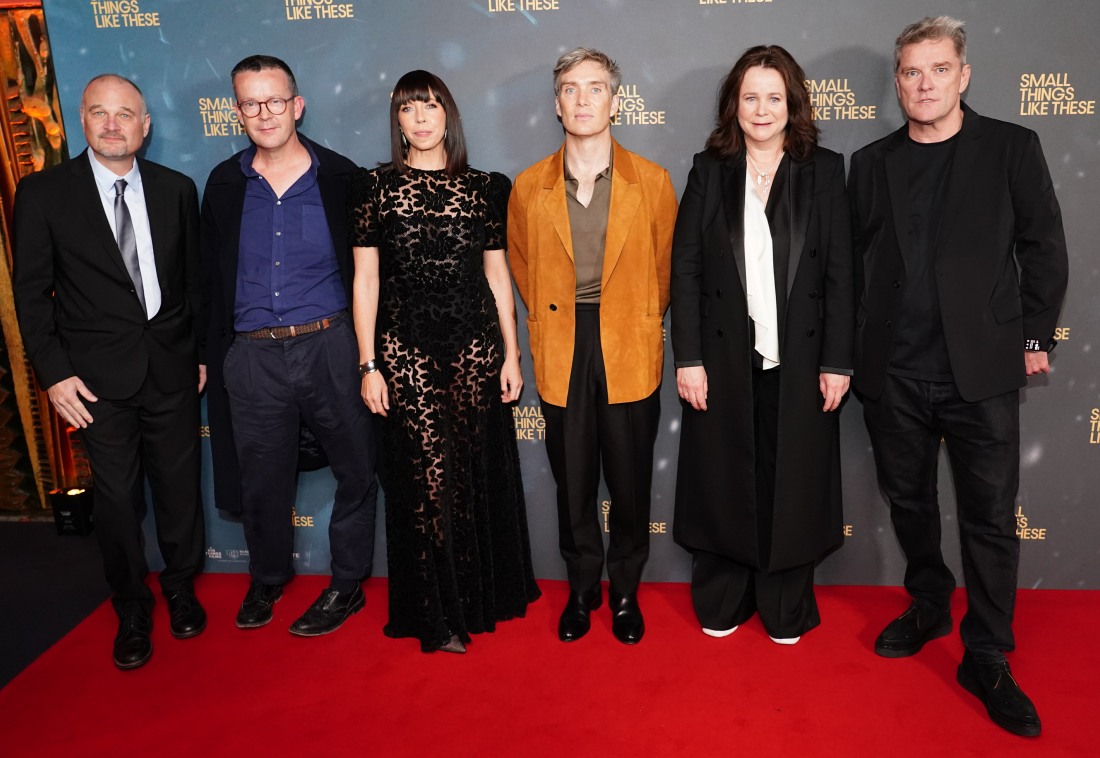Cillian Murphy is currently promoting Tim Mielants’s Small Things Like These. Cillian produced it, and he asked Matt Damon and Ben Affleck’s Artists Equity to step in as producers as well (they agreed). The film is adapted from a book of the same name, a fictional story based on the real horrors of Ireland in the 1980s – the Magdalene Laundries and the “fallen women,” the pregnant girls and women who were kidnapped and abused by the Catholic Church. Cillian recently spoke to the Irish Times and it got very personal about how horrible Ireland was forty years ago:
Cillian on the horrors of Ireland in the 1980s: “Let’s put it into perspective. It’s 1984 going into 1985. In 1984 you had the Kerry babies. In 1985 you had the moving statues. No abortion. No divorce. I think you were just able to get condoms, maybe by prescription. But it’s like the f**king dark ages compared to now. The film deliberately is trying to blur the lines. When you look at it, it could be the 1950s in many ways….you hear Come on Eileen and you think, ‘We’re in the 1980s.’ But a lot had remained the same since the 1950s. I have talked to my parents about it. We were young, obviously. I was 11 or something. We were kids, but it was a totally different time. I think when people call this a historical drama it seems bizarre. But it really does feel like another country.”
How women were viewed back then: “My mum told me this amazing expression. She said that, when she was growing up, there was this expression, ‘Lipstick on the lips, dust on the shelf.’” Good Lord. Meaning, presumably, that the sort of woman who would wear make-up wouldn’t clean the house? “So think about that. If that was something people would say, that shows you how women were viewed. That sort of stuff, it’s just mind-blowing.”
Why Cillian moved his family back to Ireland after living in London for years: “People ask me that question a lot, and I’m sure it’s the same for you. We came back for reasons that were about the kids and being near their grandparents. About having a quieter life. We weren’t motivated by politics or what’s happening socially in Ireland. We left pre-Brexit, actually. It was good timing. It worked out. It feels like an Irish story. You move away and you learn about yourself. You find yourself in London or New York. You do what you want to do and then you come home. It seems to be just a very common Irish narrative.” But it wasn’t always that common. “Oh, yeah. In the world of this movie all the young people are leaving, and they ain’t coming back.”
Some of what Murphy speaks about is incredibly recent – abortion wasn’t legalized in Ireland until 2018. Divorce wasn’t allowed/legalized until 1995. It was 1985 before regular people could buy condoms without a prescription. I had never heard of the Kerry Babies, but I looked it up and it’s a horrific story. All of it has happened within Cillian’s lifetime and he’s not that old.
Anyway, this interview got a lot of attention when the Irish Pro Life Campaign made a big statement slamming Cillian for… supporting abortion and reproductive choice. It’s just as crazy as the anti-choice sh-t we get here in America – you would think that the Irish anti-choice campaigns would actually sit back and say “you know what, given the Church’s catastrophic history in Ireland, we should just shut our mouths.”
Photos courtesy of Cover Images.
- Premiere Of ‘Small Things Like These’ at the Curzon Mayfair Featuring: Cillian Murphy Where: London, United Kingdom When: 24 Oct 2024 Credit: PA Images/INSTARimages **NORTH AMERICA RIGHTS ONLY**
- Premiere Of ‘Small Things Like These’ at the Curzon Mayfair Featuring: Cillian Murphy Where: London, United Kingdom When: 24 Oct 2024 Credit: PA Images/INSTARimages **NORTH AMERICA RIGHTS ONLY**
- Premiere Of ‘Small Things Like These’ at the Curzon Mayfair Featuring: Drew Vinton, Enda Walsh, Eileen Walsh, Cillian Murphy, Emily Watson and Alan Moloney Where: London, United Kingdom When: 24 Oct 2024 Credit: PA Images/INSTARimages **NORTH AMERICA RIGHTS ONLY**
















Well that’s timely
viva la revolution…. power to the 4B movement… its the only way to hit them where it hurts.
Evangelicals don’t consider Catholics “church”. I was taught that Catholics weren’t “saved” so no, they wouldn’t think that. Nevermind that I recently worked for 7 years at a sexual abuse agency that specialized in children and the vast majority of them were abused by deeply religious, middle-aged, white dudes. *not* Mexican immigrants ffs
My SIL doesn’t think Catholics are Christian. When her husband, a doctor, went to Afghanistan I gave him a St. Christopher medal and a St. Luke just as tokens. All she said was “we don’t do that kind of thing” in her little sister wife voice. Her husband is an ex-Catholic and was pretty embarrassed I think.
It always tells me exactly what kind of a person someone is when they make it clear that they don’t consider Catholics part of Christianity.
Most recently I asked someone who had shown me photos of their child’s baptism if they were Catholic (they had traveled back to their hometown for it and the officiant was dressed in all the vestments), she replied “oh no, we’re Christian.” I had to exert a lot of self control in that moment.
It’s such an outright ignorant statement. I’m not Catholic, I’m not even religious, but I was raised Catholic and did a lot of my studies in college about belief systems. Catholicism is, like it or not, the first official church of Christ. Deal with it
Catholicism is not the first church of Christianity. I grew up in Jerusalem, and I did go to a catholic school for 10 years, but it’s such a sensitive topic. The coptics, the melkites, the Armenian eastern catholics would also disagree that Roman Catholicism was the first church. It isn’t. It’s a huge sensitive topic and I am tired of western society having a monopoly over chrsotnairy, considering that Christianity has always been a Middle Eastern religion.
So, Ireland in the eighties was like the US now, or soon will be. I’ll have to do some research on how the Irish finally managed to liberate themselves from the Church’s oppression.
After the church was outed for widespread abuse of children and their consequent cover ups, many people lost faith and drifted from it. Then the stories of the Magdalen laundries compounded the disillusionment. They just did too much horrible stuff in the name or under the protection of the church.
Abortion rights were ushered in by dead children in Ireland. Children died from illegal abortions and being forced to carry babies. The Irish voted to save their children. The US has already shown that its children are cannon fodder — they watch their kids get shredded by guns in school and don’t care about 12-year old kids carrying babies and the risks involved. They simply do not care.
I have no idea what you are talking about here? If anything it was dead women such as Savita Halappanaver that turned the tide for us in Ireland. And illegal abortions weren’t really a thing here much. Instead women would get on the ferry (80s/90s) to England, or more recently a flight, to get abortions.
@ Creek — The X Case in 1992 made clear that children could not, in fact, easily travel for an abortion, even those who had been raped. Cases in which parents did not agree on the choices to be made for their pregnant children are the ones I am thinking of. And I’m sorry to say that illegal abortion does exist. Not everyone had the ability to pop over to England, especially not children. Just like in the US, not everyone will be able to go to Canada once a national ban is enacted. I admire Ireland’s ability to protect women although I understand the fight is still ongoing.
Yes, case X was about that, but no it did not usher in abortion being legislated for. Like you said, that was 1992. Ann Lovett died in 1984. Abortion was not passed until 2018. While these instanced were horrific, it is a significant micharacterisation to say that “the irish voted to save their children”, or to frame the country’s choice as being about pregnant children. The driving force was the realisation that abortion is healthcare. Speaking as a Tá voter in that referndum, who was very involved.
Why can’t voting men in the states be more like Cillian?
I had a friend that flew from Australia exclusively to vote in 2018 – it was huge, the out pouring of energy to finally get womens rights protected was wild.
It really was. Still gives me chills thinking about how much people can do when we all focus on a shared goal, it was an incredible time in recent Irish history/society. Still get a little buzz of excitement seeing an odd Repeal/Together For Yes sticker or shirt in the wild ❤️
I friend of mine moved to Ireland because of the tech industry in the mid 90s. Ireland was s country at war with itself–the IRA and Norther Irish still used violence against each other. The Celtic Tiger and EU did a lot to improve the economy and infrastructure there. 9/11 cut offa lot of money to weapons and terrorists.
The violence was almost exclusively outside of the Republic of Ireland, which is what Cillian is talking about.
This is not true. Northern Ireland was in the throes of civil unrest. The country of Ireland was not. You really should not conflate the two in terms pf violence and unrest. Ireland was part of the EU for 20yrs at that point. By the mid 90s Ireland was moving away from religion, and the economy was getting stronger and stronger.
Ciotog and Creek, people in the Republic were raising money and moving guns up north. Ues the troubles were mainly across the border, but they were still shutting the border down as well.
I’m Irish, born in 1977. He’s not wrong. Right up to the early 1990s. Being gay was decimalised in 1993. My brother came out a few years later to a much different climate. I think with gay and women’s rights, a lot of it was driven by women (mothers in particular). Being totally fed up about how their sons or daughters were being treated and deciding- no more! Also Ireland is small – and everything is local. So with the two recent referendums on gay marriage and abortion, it was people sons/daughters/nieces/cousins being brave enough to speak up publicly about how irelands archaic laws were affecting them – in terms of their health, their legal status etc etc. Irish people have a high standard of education which helps a lot with debate. In addition, the gap between rich and poor is less extreme as the US and UK. In more recent years however, extreme rhetoric from right and left has taken hold in social media so greater polarisation is happening.
Besides social media, the anti-abortion crowds in USA are pouring a lot of money and resources to UK in order to influence the conversation. I wouldn’t be surprised if this Irish anti-choice group is also getting money from USA.
@Latte, fellow Irish person born in 1977. My first vote was the divorce referendum in 95. And my first real inkling about reproductive choice was the X case. At that point I was in school and one of the only ones in my class who wasn’t wearing one of those little feet pins on my uniform (convent education 🙄) that they practically forced on us. My mother was always pro choice and that case on the news every evening incensed her.
@Sevenblue, you’re absolutely correct. The money coming from the US to fund the likes of Youth Defence and other anti choice organisations has been a huge thing for a very long time now.
Horrible fact: if you bought a Hasbro board game in the 80s and 90s, chances are they were assembled by women essentially enslaved in the Magdalene laundries. I remember the testimony of one survivor who said the worst game to assemble was Mouse Trap – so many fiddly pieces!
My Irish ex MIL has 12 siblings and her father had 24 surviving siblings. Her grandad had married three times as the first two wives died during child birth.
Infant mortality was high too. If the baby died before being baptised, the parents were made to believe that their baby was in hell or in limbo. This caused much suffering and anguish to the grieving parents.
I so admire Cillian Murphy. He’s saying pretty much the same as what my co workers in Ireland told me. Same sentiments.
This will likely be a good movie.
But after Trump, I can’t watch anymore suffering.
Cillian and the Peaky Blinders movie is the only reason I still have Netflix.
Love Cillian for doing this film. By the early 80s it was wild how different your experience as a young unwed mother could be in Ireland. In 1982 my mother had a degree, a good job, and was 21 when unmarried and pregnant with twins. She was secure, the laundry was no risk to her. But god help you if you found yourself pregnant, under 18, and your parents were religiously inclined. And it could only continue for so long with societal complicance.
I was an exchange student in Dublin in 84 (tried to vote for Mondale, but we were so young and dumb we didn’t know you couldn’t just roll up to the US Embassy on election day. They laughed very hard through the 6 inch glass window). The course did a meeting with all of us the first week — “contraception is illegal but here are 2 clinics that will proscribe for you. Don’t get pregnant because if you do you’ll have to go home or go to London for an abortion” — and my favorite moment, an older man at the bar calling me a slut for dancing with my boyfriend, and then my dude friend in sequence. “Fucking slag. Doin’ em both are you?”
I loved much about that semester, especially that since everyone was still broke, it was a good place to be a student — but it was oppressive as hell. The north was still blowing shit up, people were completely shut down, it was a whole thing. I lived with a radical single-mother Communist who worked for RTE, so that was great — opened my eyes to so much. But yeah. Ireland in the 80s.
@Charlotte this was fascinating to read, thank you for sharing.
It was an amazing semester. Eavan Boland taught my course in the Irish Short story, just on the cusp of getting famous. She was SO important to me. The only women poets I’d known until then all killed themselves, and there she was, smart and kind and 2 gorgeous daughters and a husband who loved her. Met her again 15 years later when I was in a PhD program for fiction and she was teaching at Stanford and it was a good laugh. Seamus Heaney and Seamus Deane came and did a reading, then gave my boyfriend and I a list of pubs in Connemarra we should go to on our upcoming trip.
But the sexual politics were suffocating, not exponentially more than the Catholic sexual politics we knew from the States, but suffocating nonetheless. And the North was still scary — we went to London for Thanksgiving after they’d tried to kill Thatcher in Brighton and it was Very High Alert.
And don’t forget — Sinead O’Connor was in one of the last of the laundries for a bit as a teenager …
My boyfriends parents are in their 70’s and moved to the UK for his dad’s work in the 1980’s but hearing their stories of what life was like, the guy who sold the condoms from his garage, etc. is quite something. Both he and his younger sister were adopted via the nuns, he was born in 1979 and she’s 1984. Oh and his mum is one of eight!
A good friend of my mum when I was younger up had come to the UK pregnant in the late 70’s because it was that or give her son up for adoption and she refused.
The Claire Keegan novel on which this movie is based is wonderful and short .. I read it in a single afternoon.
Irish citizens, what’s the country like now? Would the western counties be a safe place for my adult queer daughter?
Ireland is safe for queer people. Marriage equality was voted in by the population. Leo Varadker was our Taoiseach (political leader) for quite a while, an openly gay (and, unrelatedly, an asshole) man. Of course there is the occasional bigot. However i played roller derby for 8yrs with a diverse lgbtq community for whom personal safety and freedom due to sexuality was not a concern.
On a completely shallow note (and I have found the non-shallow comments here very interesting and enlightening), how has Cillian Murphy gotten hotter?! I guess he gained some weight back after starving himself to play Oppenheimer. But good lord.
He’s a silver fox now, that’s how
@kerfuffles, came here to say exactly the same thing. Glad I’m not the only shallow one.
Cillian is good people. Hugely supportive of March for Choice every year and did some lovely things for people who were involved in Together For Yes, the campaign to repeal the 8th Amendment.
Also, it can’t be stressed enough how a young Sinead O’Connor tried to bring some of the church’s abuses to light when she went on SNL.
Sinead’s protest/s and then the way she was brutally treated by people really tore at my heart – even though I had to read about it more after her death.
The book is short, sharp but not completely dark, I choose to see it as hopeful… can’t wait to see the film and Cillian is always a wee hot fox!
I grew up in rural Ireland in the 1980s and what comes to mind socially are things like the Church, Fianna Fáil (a bit like the American Republican party or UK Tories) and the hypocrisy surrounding them all.
In the 1990s, we had the X case (https://www.thejournal.ie/twenty-years-on-a-timeline-of-the-x-case-347359-Feb2012/), a load of tribunals dealing with FF’s political corruption & backhand deals, the Magdalene laundries (https://www.euronews.com/2023/07/04/chamber-of-horrors-remains-of-hundreds-of-babies-to-be-exhumed-from-mass-grave-in-ireland), child abuse by priests in schools… I could certainly go on.
I realise it is #NotAllPriestsAndNuns and #NotAllFFs but the amount of verified cases between them are in the thousands! I’ll never understand why people still vote FF after all the shenanigans they’ve been in.
An old book called “Valley of the Squinting Windows” is a good place to start, or an old Maeve Binchy like ‘The Glass Lake’ if you want a snapshot of how everyone was keeping tabs on you and rattling off to the priest back in the day, or gossiping about you behind your back.
Irish women were taking a ***massive risk*** in having pre-marital sex back then, consent or no consent.